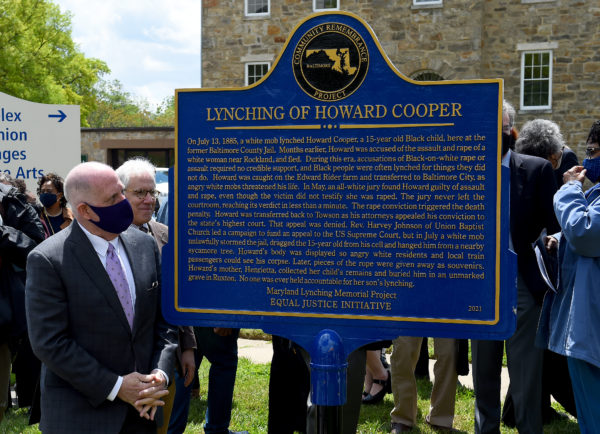Governor Larry Hogan issued posthumous pardons to 34 Maryland lynching victims on May 8, reported the Baltimore Sun. Among them is including Howard Cooper, a 15-year-old Black boy who was dragged from the Baltimore County Jail and hanged outside the Towson jailhouse by a white mob in 1885.
According to Hogan’s office “it was the first time a governor has issued a ‘blanket pardon’ for the victims of racial lynchings.”

“In the interest of equal justice under law, I have made the decision to grant a posthumous pardon today for Howard Cooper,” Hogan announced at a Towson outdoor ceremony during which Cooper was remembered with a marker while the governor and other officials honored him with speeches.
“And studying this case led me to dig deeper,” Hogan added. “Today I am also granting pardons to all the 34 victims of racial lynchings in the state of Maryland which occurred between 1854 and 1933.”
An all-white jury convicted Cooper of raping Katie Gray, a white teenager, even though neither Gray nor Cooper testified that she was raped. He was sentenced to death by hanging, and was lynched on July 13, 1885, before his conviction could be appealed to the U.S. Supreme Court.
Hogan said he was prompted to act after being appealed to by students at Loch Raven Technical Academy who insisted Cooper get a pardon “in light of the fact that he was never afforded due process under the law.”
Cooper’s marker will be the second in the state of its kind. The Salisbury Lynching Memorial Task Force and the Equal Justice Initiative will install a third historical marker on May 22 in Salisbury memorializing three lynching victims in the town.
Hogan, a Republican, said that he hopes the deed will help to offer some peace to the victims’ descendants and “in some way help to right these horrific wrongs.”
The Maryland Lynching Memorial Project has identified at least 40 people who were lynched in racial confrontations in the state, however not all of those people were charged with a state crime, becoming eligible to receive a pardon, NPR reported.
The organization is working to collect soil samples from every known lynching site and is planning to memorial markers at each of those sites, according to the Baltimore Sun.
The Equal Justice Initiative staff traveled to Maryland in 2017 to work with local volunteer groups gathering samples from six lynchings on the Eastern Shore. Each soil sample was collected in a jar displaying the victim’s name and additional information, then sent to a Montgomery exhibit.
Of the more than 5,000 lynching cases in America, there is no known perpetrator to have been convicted of murder. While a few U.S. senators backed the passage of anti-lynching laws as early as the 1920s, Congress has never passed a bill.
In 2005, the Senate passed a resolution apologizing for its “failure to enact anti-lynching legislation” and expressing its “deepest sympathies and most solemn regrets” to victims’ descendants.
Amid the widespread protests last year over police treatment of Black Americans, politicians, including then-Sen. Kamala Harris, reintroduced a measure to pass the Emmett Till AntiLynching Act, whose passage stalled despite bipartisan support.
Governor Hogan’s announcement makes Maryland the first and only state to grant a complete set of pardons to the men and boys lynched in the state.


